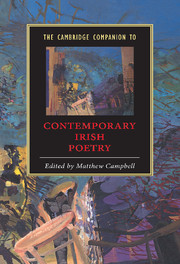Book contents
- Frontmatter
- 1 Ireland in poetry
- 2 From Irish mode to modernisation
- 3 Patrick Kavanagh and antipastoral
- 4 Louis MacNeice
- 5 The Irish modernists and their legacy
- 6 Poetry of the 1960s
- 7 Violence in Seamus Heaney's poetry
- 8 Mahon and Longley
- 9 Between two languages
- 10 Boland, McGuckian, Ni Chuilleanain and the body of the nation
- 11 Sonnets, centos and long lines
- 12 Performance and dissent
- 13 Irish poets and the world
- 14 Irish poetry into the twenty-first century
- Further reading
- Index
- Series List
12 - Performance and dissent
Irish poets in the public sphere
Published online by Cambridge University Press: 28 May 2006
- Frontmatter
- 1 Ireland in poetry
- 2 From Irish mode to modernisation
- 3 Patrick Kavanagh and antipastoral
- 4 Louis MacNeice
- 5 The Irish modernists and their legacy
- 6 Poetry of the 1960s
- 7 Violence in Seamus Heaney's poetry
- 8 Mahon and Longley
- 9 Between two languages
- 10 Boland, McGuckian, Ni Chuilleanain and the body of the nation
- 11 Sonnets, centos and long lines
- 12 Performance and dissent
- 13 Irish poets and the world
- 14 Irish poetry into the twenty-first century
- Further reading
- Index
- Series List
Summary
The poetry of dissent, indeed the dissenting position in literature as a whole, has a long and distinguished tradition in Ireland. For reasons of political and personal sensitivity, writers have found themselves in, and often cultivated, a marginalised, observing status. The presence of aesthetic and political tensions can be linked closely to Ireland's continuing absorption of differing influences and experiences: these can both conflict with and build upon existing ideas of tradition and continuity. The adversarial position adopted by Irish writers earlier in this century focused on oppositional relations such as those between Ireland and England or between individual freedoms and the Catholic norms of the evolving state. Now violence, materialism and social exclusion have become the focus of attention and with these forms comes a complex matrix of affects neither easy to define nor to address. The poets dealt with in this chapter - Brendan Kennelly, Paul Durcan, Rita Ann Higgins and Nuala Ní Dhomhnaill - are aware of the tensions inherent in these issues and of the fact that they are never fully subject to artistic or personal control. Indeed it is this lack of control that heightens the risks taken by these poets to allow their voices to be heard. All four poets are widely read, in a culture where the critical attention to poetry still far exceeds popular readership, and all the poets use vibrant humorous language and frequent public performance to maintain the dissenting voice within contemporary Irish poetry.
- Type
- Chapter
- Information
- The Cambridge Companion to Contemporary Irish Poetry , pp. 209 - 228Publisher: Cambridge University PressPrint publication year: 2003
- 2
- Cited by



